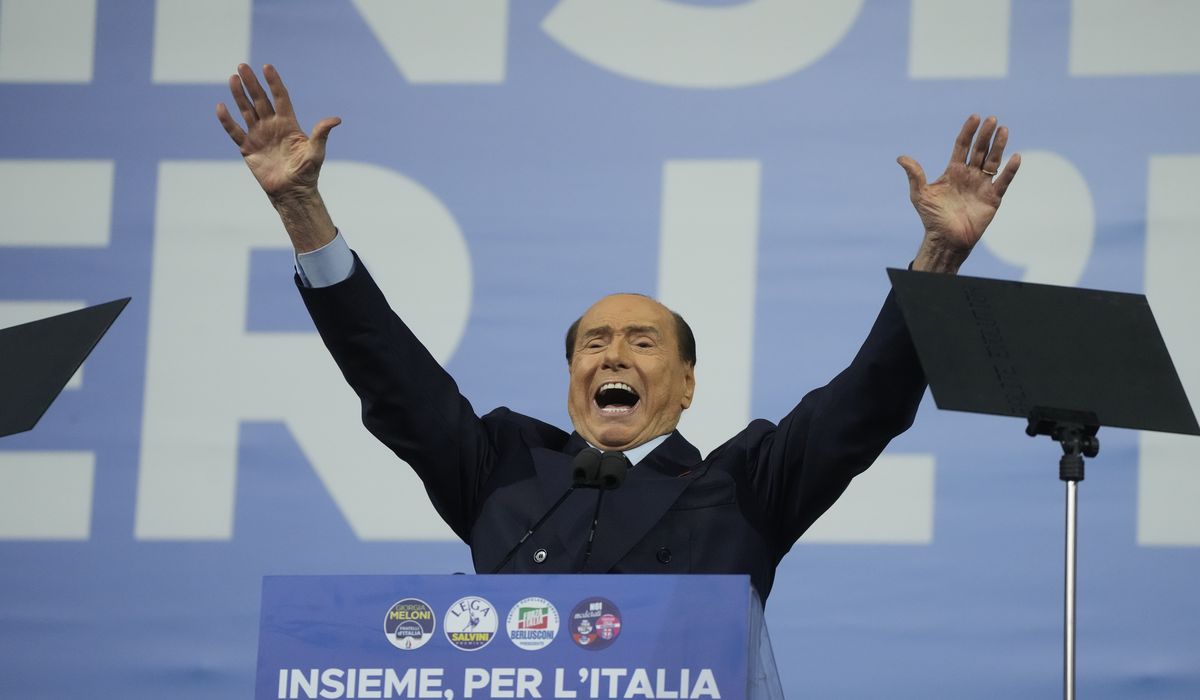Checkered and colorful, Berlusconi created a template for populists

ROME — Silvio Berlusconi, the colorful Italian tycoon and four-time premier whose unlikely career provided a template for Donald Trump and other populist political outsiders around the world, died Monday at the age of 86, a watershed moment in Italian political history that elicited reactions from world leaders as varied as Russian President Vladimir Putin and Pope Francis.
Mr. Berlusconi courted legal and personal controversy his entire professional life, ranging from bragging about “bunga bunga” sex parties to being indicted on dozens of charges ranging from bribery to defamation and from money laundering to influence peddling.
A billionaire businessman who delighted in outraging Italy’s traditional political elite, Mr. Berlusconi also repeatedly defended figures including strongman leaders such as Benito Mussolini and Moammar Gadhafi and once called himself “the Jesus Christ of politics.”
He also complimented then-President Barack Obama on his “tan,” and he deflected charges of paying an underage girl for sex by declaring that it was “better to like beautiful girls than to be gay.”
But snickering and irreverence aside, the Milan native was also a towering figure — both influential and polarizing — who reshaped the Italian media and political landscape in his image. His business empire in time would include television networks, newspapers, real estate, investment companies and the fabled AC Milan soccer team.
“Berlusconi transformed Italian media by providing the first national alternative to the state broadcaster with his more entertaining rival Mediaset,” Riccardo Puglisi, a professor of public economics at the University of Pavia in Italy, told the Washington Times. “In politics, he was there after a collapse of the old political order to help form a two-coalition system that survives to this day.”
Mr. Berlusconi was born into modest circumstances in Milan, selling vacuum cleaners door to door and working as a crooner on cruise ships. Somehow — mob ties were alleged but never proven — he soon prospered at property development and from there he created Mediaset, a company that made him one of the richest people in Europe.
He helped reverse AC Milan’s fortune starting in the 1980s, and then, when Italy’s political establishment collapsed amid corruption scandals in the early 1990s, Mr. Berlusconi stepped in to become one of the world’s first celebrity politicians. The political party he created, Forza Italia, took its name from a popular chant from soccer games.
He had four stints as premier between 1994 and 2011, when he resigned for the last time amid personal scandal and soaring government borrowing costs. But he remained engaged in politics until the end, holding a Senate seat until his death, while the center-right Forza Italia is a key junior member of conservative Prime Minister Giorgia Meloni governing coalition. Even as his leukemia worsened, Mr. Berlusconi produced an energetic address at a party conference via video call in late May, and was whipping up support among his followers on social media until a week before his demise.
In a European Union that has strongly backed Ukraine in its war with Russia, Mr. Berlusconi was the most high-profile political leader to continue to support Mr. Putin. The two men vacationed together multiple times in Italy and Russia, and he kept up his friendship with the Russian leader even after the invasion of Ukraine in February 2022.
“I have always sincerely admired his wisdom, his ability to make balanced, far-sighted decisions even in the most difficult situations,” Mr. Putin said in the telegram released by the Kremlin Monday. “During each of our meetings, I was literally charged with his incredible vitality, optimism and sense of humor.”
Mr. Berlusconi will be honored with a state funeral on Wednesday at the Duomo Cathedral in Milan. The longer-term impact of his absence from the delicate political scene here is subject of major discussion. It is uncertain whether Forza Italia, a key junior partner of the governing coalition, will dissolve without Mr. Berlusconi’s leadership and if that happens it could impact the stability of the Meloni government.
Mr. Berlusconi was first married in 1965 to Carla Dall’Oglio, preparing his children to take hold top positions in his business empire. He married his second wife, Veronica Lario, in 1990, and they had three children, Barbara, Eleonora and Luigi. They also divorced, and at the time of his death he was in a relationship with Marta Fascina, 33, who was elected to parliament last year for his party.
Francesco Sisci, an international affairs expert with Rome’s LUISS University, said Mr. Berlusconi’s death could also have an impact on the war in Ukraine.
“Putin has lost his most reliable ally not only in Italy but in Europe at a time when Ukraine is in the midst of its counter-offensive,” Mr. Sisci said in an interview, noting that Mr. Berlusconi helped pull the plug on the previous Italian government of Prime Minister Mario Draghi, one of Ukraine’s earliest supporters. “This could be a blow, a serious blow, for Putin.”
— This article was based in part on wire service reports.

